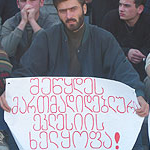 Brethren In Christ, Divided: Orthodoxy and Catholicism Clash in Georgia
Brethren In Christ, Divided: Orthodoxy and Catholicism Clash in Georgia
This Georgian news story from 2003 recounts the protests over the Vatican concordat which was to be signed after secret negotiations. Orthodox clerics led demonstrations against it and the Vatican's foreign minister, Archbishop Tauran, was obliged to return home with the concordat unsigned.
Brethren In Christ, Divided
Orthodoxy and Catholicism Clash in Georgia
By Giorgi Sepashvili, Civil Georgia, 2003-09-29
http://civil.ge/eng/article.php?id=5019
 The sign reads ""Stop Infringing Orthodoxy"
The sign reads ""Stop Infringing Orthodoxy"
The Georgian government has yielded to pressure from the Georgian Orthodox Church and delayed signing of the inter-state treaty with the Vatican. Along with the international embarrassment, the power of the Orthodox Church’s isolationist lobby was revealed once again.
The Political Debacle
President Eduard Shevardnadze made a last minute decision not to sign an agreement with the Vatican after the mass protest rally took place on September 19, backed by the Georgian Orthodox Church. An agreement, along other inter-state issues, would have guaranteed religious freedom and legal rights for the Catholics in Georgia.
President Shevardnadze expressed regret on September 22 over the failure to sign the agreement, explaining the incident with “misunderstanding.”
"Development of the draft agreement started in Georgia long ago, immediately after the visit of Jean Paul II, the Pope of Rome, to Tbilisi [in 1999]. The agreement aimed to settle the cooperation between the two states. I am of Orthodox faith, but I honor all other religions," Shevardnadze said in his Monday radio broadcast on September 22.
He said the work over the draft would continue. The President also said that simultaneously, the Parliament would continue its work on the draft Law on Religion.
Observers note that the change of heart towards the agreement was caused by Georgian government’s unwillingness to risk losing support of the influential Orthodox Church on the eve of the parliamentary elections on November 2.
Archbishop Msgr. Jean-Louis Tauran, Secretary for the Holy See's Relations with Foreign States, who arrived to Tbilisi on 18 September, was forced to leave empty-handedly on September 21.
Archbishop Jean-Louis Tauran sounded bitter at the aim of his trip being thwarted by “the last-minute rethinking by Georgian authorities.”
“The Holy See hopes that Georgia, member of important international conventions on human rights, knows how to remedy this regrettable situation,” Archbishop Tauran stated. The statement also reads that the Holy See felt “gravely wounded” by the attitude of the Georgian Orthodox Church, which had “diffused news that didn't correspond to reality, despite the fact that it was on several occasions given the chance to be informed of the progress of negotiations.”
The Georgian Orthodox Church used all of its political muscle to prevent the agreement from being signed. Firstly, it acted as a public whistleblower, issuing a statement before the arrival of the Vatican’s Foreign Minister, the Georgian government intends to sign a secret document with the Vatican aimed, the Orthodox Church claimed, at increasing the Vatican’s influence in Georgia.
In his rare press-conference on September 18 the leader of the Georgian Orthodox Church, Catholicos Patriarch Illia II held said “an interstate agreement between Orthodox Georgia and the Vatican cannot be regarded as expedient.”
“We do not know the details of this document. We signed a Concordat with the Georgian state [in 2002] and people knew the details of that document; it was publicly discussed. This agreement [with the Vatican] will cause serious problems for the Georgian government,” the Patriarch said.
The Orthodox Church’s statement was followed by the mass protest rally in front of the Parliament on September 19. Thousands of Orthodox Christians, mainly the students chanted anti-Vatican slogans. Some held handwritten banners: “Hands away from Georgia,” “We won’t let sign this treaty,” “Georgia without Vatican.”
Several high ranking Orthodox Church officials also attended the protest rally. Bishop Zenon of Dmanisi, an influential Orthodox official addressed the protest rally and thanked the protesters “for reviving the Georgian spirit by protesting against the agreement.”
“While there is freedom of faith and religion in Georgia, our Constitution grants priority to the Georgian Orthodox Church and this is enforced by the Concordat signed between the Georgian state and the Church,” Bishop Zenon added.
Radical Orthodoxy?
Last October, President Shevardnadze and the Patriarch of the Georgian Orthodox Church, Ilya II, signed a Concordat which gives the Orthodox Church important privileges over other religious groups.
The Orthodox Church fears that the agreement with the Vatican would have threatened its exclusive rights in Georgia.
During the visit of Pope Jean Paul II to Georgia in 1999, many Orthodox priests called on their parish not to attend the papal Mass, saying it would be a sin. [...]








